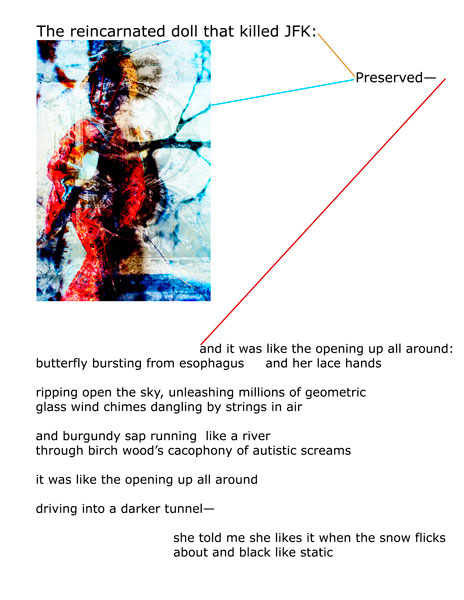By Jacob Luplow ’16
My first semester at Cornell was loaded with awesomeness: photographing King Chapel a million times over, reading “Paradise Lost” until I began dreaming in 17th-century rhetoric, tweaking out with Beethoven and 35mm negatives in the darkroom at 3 a.m. But there is one aspect in particular that made it extraordinary.

“it was like the opening up all around: butterfly bursting from esophagus and her lace hands”
These are the words that I plucked on my keyboard at the start of Block 4, but their origin is hazy—like a conjoined twin-voodoo experience between my muse and me. But where are they going? I’d thought. Where is any of this going?
This was approximately two hours after I had quit chewing tobacco (again), had convinced myself I had cancer in my lip, and was slaving away on some poetry. 482 hours later, however, my creative ambitions began falling into place and I realized my academic advisor truly is an oracle.
I transferred to Cornell College at the start of this academic year from South Puget Sound Community College in Washington State. I came with the dream of making a career as a writer and a plan to pursue a Bachelors of Special Studies, concentrating on creative writing, art, psychology, and philosophy.
I remember meeting with my advisor at the start of the year, and he had explained that some of the best writers he knows have taken classes far and wide, between many different academic departments. His advice crawled my blood like a virus and it seemed a riddle.
I left his office, went home, and decided I needed to figure out what he was really getting at—and quickly. I translated his advice: the importance of approaching my learning and goals with a natural curiosity is paramount.
I began approaching my studies in such a way, but I wasn’t entirely sure the importance of it, and I didn’t quite understand how the classes would build upon each other in a way beyond simply earning a degree. But I pressed on with his advice in mind, and it was the culmination of my second and fourth block classes, photography and advanced poetry writing, that brought direction to the madness stirring within.
In my photography class, Professor Dyas had instructed me to choose a photographer to study from; I chose Duane Michals and found myself naturally enticed by his inclination to incorporate prose with conceptual art. This seemed odd at first, but I pried a bit further into his life and learned that he believes photography to be an unstable medium by itself. This I could accept, given I value writing as much as photography, but I was a bit unsure as to what made photography unstable.
Fast-forward now to my fourth block poetry writing class. At the start of this block, Professor Freeman had given us all several packets of poetry to read, but it wasn’t enough; I wanted more, and I stumbled upon poet Ezra Pound.
Among his beliefs was the power of a good poetic image: “An ‘Image’ is that which presents an intellectual and emotional complex in an instant of time.” This definition seemed a bit strange in comparison to the beliefs of Michals: on the one hand, Michals believed images (or photos) are unstable and that they need contextual information to make them otherwise. On the other hand, Pound believed the correct image is inherently stable.
Throughout the rest of Block 4, I continued following my “natural curiosity,” drawing connections between Michals and Pound as I went round and round in a fury of mental obsession.
And 482 hours after I had typed those two lines of verse on my computer, I found direction: experimenting with the play of stability and instability with the combination of abstract art and poetry. And so I have decided to work on a collection of experimental art/poetry titled “Like Lotus Through Glass.”
I told you, there is one aspect that has made my Cornell experience extraordinary, and that is direction: the direction my advisor gave me to pursue excellence with a natural curiosity—and to pursue my dreams just so, pressing on the boundaries and refining creativity.
I’m on a plane flying back to Seattle right now. The lady sitting next to me is reading this article. She has asked to see my lip. She says, “That’s not cancer. You just need a bit of direction; it should subside soon…”